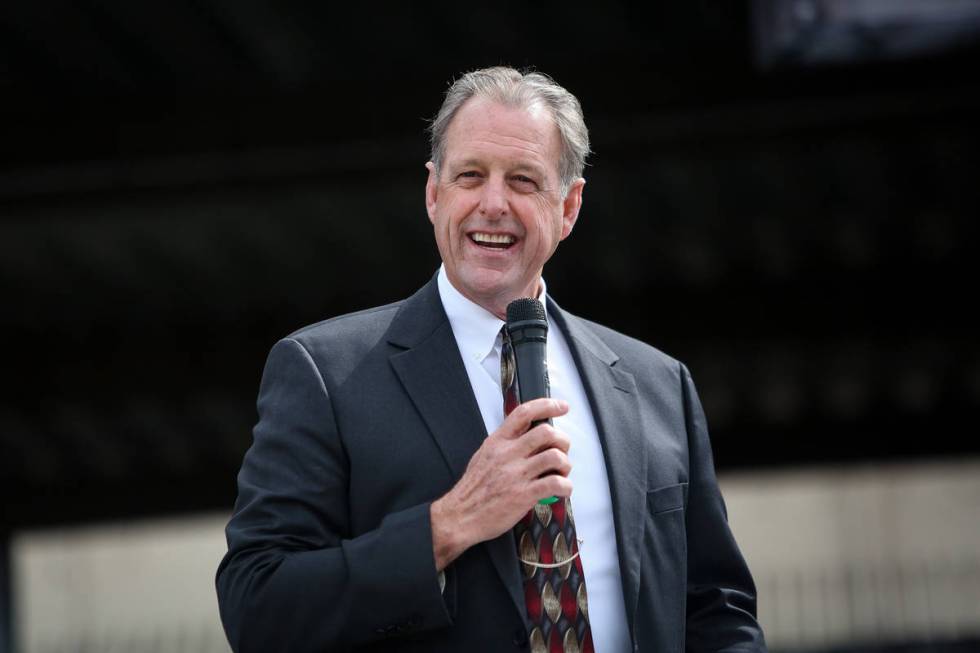STEVE SEBELIUS: Does John Lee’s party switch really matter?

In one sense, North Las Vegas Mayor John Lee’s announcement that he’s quitting the Democratic Party and joining the Republicans is the least surprising local political story in a long time.
Lee has always been known as a conservative Democrat; he was coaxed by the Republicans to change parties more than once during his years in the Legislature. Lee lost a Democratic primary in 2012 at the hands of progressive Democrat Pat Spearman.
So it’s unsurprising that Lee — citing the recent Nevada State Democratic Party elections that brought a slate of progressives affiliated with the Democratic Socialists of America into office — would finally make the switch.
As Judith Whitmer, the new chair of the party said, Lee’s long been out of step with Democrats, being pro-life, highly rated by the National Rifle Association and having voted for Donald Trump — twice.
Ironically enough, Lee cited some of those same things in justifying his switch. “It just became such that a pro-life, pro-gun Christian such as me was finding that there was definitely no place left in this party anymore,” Lee said after announcing the change last week on “Fox and Friends.”
In another sense, Lee’s party switch makes perfect sense because he says he’s been courted to run for governor on the Republican ticket. Why make such a big production — a national interview! — about his affiliation unless there was something high-profile in his future? While Lee steadfastly refused to discuss that future, he did confirm what he said back in 2017, that he doesn’t intend to run for a third term as mayor next year.
Oh, hey, the race for governor happens next year, doesn’t it? And Lee would have an easier path running as a Democrat-turned-Republican on the GOP ticket than challenging a well-funded sitting governor in his own party’s primary.
Ultimately, Lee’s party switch may not matter at all.
If the 2020 elections taught us anything, it’s that the more vocal members of both parties’ base may command the attention, but the electorate seems to be squarely in the middle.
Consider: A liberal ran against a moderate in the Democratic primary, and the moderate won. In the general, the moderate ran against a demagogic populist, and won again, with 81.2 million votes. But that populist still earned 74.2 million votes. A Reaganesque landslide it was not.
The U.S. Senate swung for the Democrats, but by the barest of margins: The chamber is currently divided 50-50 (including two independents who caucus with the Democrats). Republicans gained 15 seats in the House to leave the chamber divided by a narrow 222-213. Here in Nevada, Republicans gained a seat in the state Senate and three in the Assembly, robbing Democrats of their previous supermajority in the lower house.
Voter registration statistics show that since 2011, nonpartisan voters have grown as a percentage of the electorate in every single year, now constituting fully a quarter of all active registered voters. Democrats and Republicans have both lost voters as a percentage of the electorate in that same time. And that trend was apparent long before automatic voter registration at the DMV led many to sign up as “nonpartisan” by default.
The partisan wars may be in full flower on cable and social media, but they’re becoming less relevant to the voters who are not committed members of the base in either party. More people have begun to notice that the angry shouting — meant, in part, to distract from the stunning lack of accomplishments — is just theater.
People outside the political-industrial complex are less interested in who’s winning than in the problems they face, especially during the last year of the pandemic. They’d prefer competent management and low-drama consensus building over partisan battles that seemingly always end in stalemates.
Lee knows this, too. He inherited problems when he was elected mayor, including budget deficits and questionable management choices that he’s worked to fix. Things are looking better in his city, and that has more to do with hard work than with partisanship.
The competition between different philosophies has been a hallmark of America since the start and won’t go away anytime soon. But another hallmark, one that we’ve lost sight of in recent decades, is the ability to compromise to get something done.
Ultimately, the public cares more about people who can fix their problems than the letter fixed behind someone’s name.
Contact Steve Sebelius at SSebelius@reviewjournal.com. Follow @SteveSebelius on Twitter.